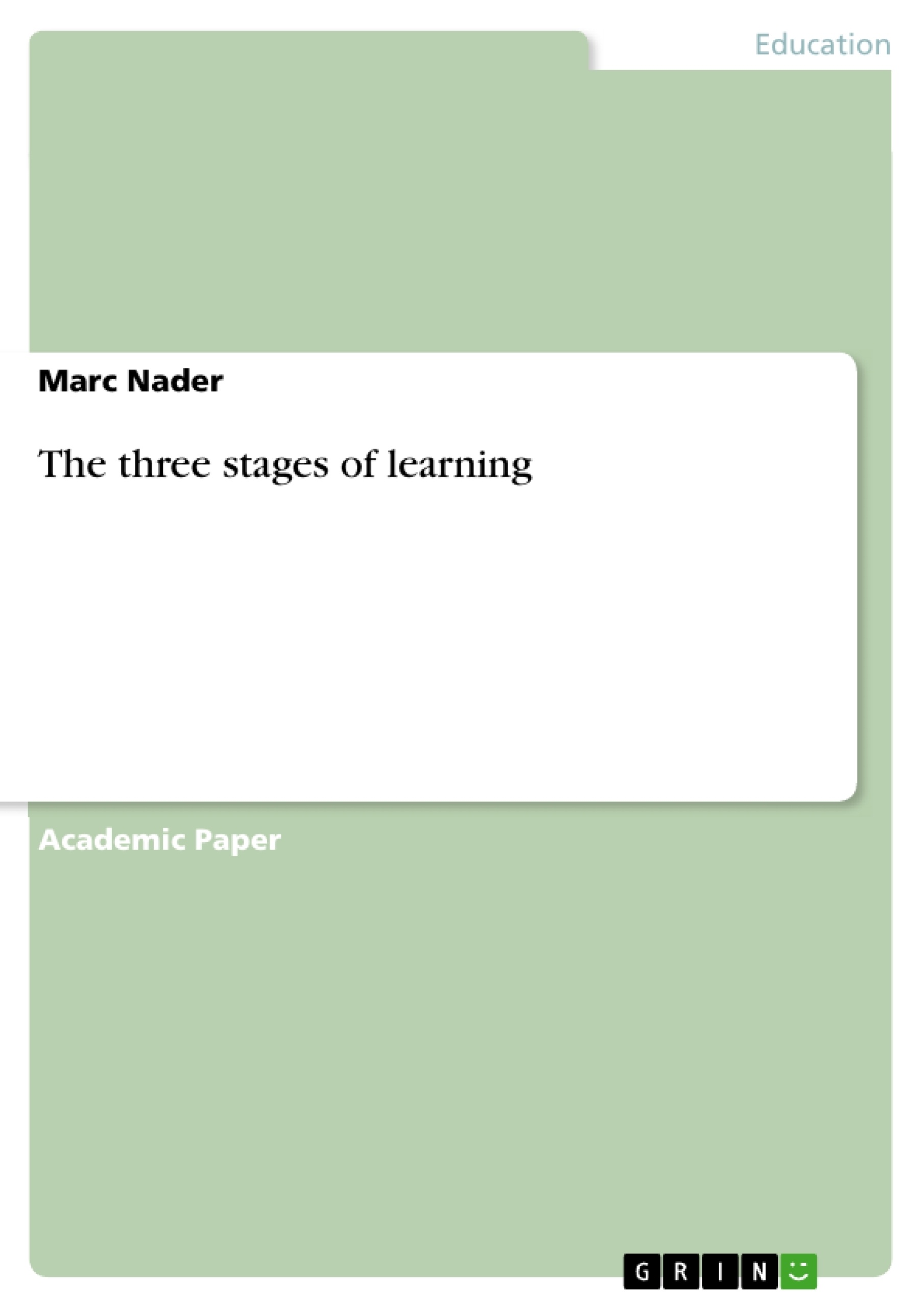People’s means of learning concepts may hugely vary based on each individual and the manner they grasp diverse life elements, which could be discovered at an early age while learning in school. Textbooks and lectures, visual and audio would improve children’s reading and writing skills. Learners could be categorized as visual, aural and kinesthetic (practical) learners (Sadker, 2005). Other learning styles assessed may include cooperative learning such as Jigsaw, a method discovered by Elliot Aronson in which students are grouped into study teams. The materials are administered via audio, visual or kinesthetic presentation and it is the student’s responsibility to assimilate and retain the academic materials. Other approaches include learning together, thinking, paring and sharing. In this essay the three stages of learning, assessment on previous stages, evaluation, leadership roles and personal growth remarked after the course will be discussed.
Table of Contents
- The Three Stages of Learning
- Stage One: Practices
- Stage Two: Principles
- Stage Three: Essences
- Assessing Strategies for Facilitating Organizational Learning
- Prior Knowledge and Learning
- Cognitive Learning and Artificial Intelligence
- Organizational Development
- Leadership Roles and Personal Growth
- Social Constructivism and Cooperative Learning
- Impression Management and Teamwork
Objectives and Key Themes
This essay explores the three stages of learning, focusing on how individuals acquire knowledge and skills in a new discipline. It examines the role of practices, principles, and essences in the learning process, highlighting the importance of understanding the underlying rationale behind a discipline. The essay also delves into strategies for facilitating organizational learning, including the significance of prior knowledge, cognitive learning, and organizational development. Finally, it examines the role of leadership and personal growth in a learning environment, emphasizing the importance of teamwork, social support, and effective communication.
- The three stages of learning (practices, principles, essences)
- The importance of prior knowledge in learning
- Strategies for facilitating organizational learning
- Leadership roles and personal growth in a learning environment
- The role of social constructivism and cooperative learning
Chapter Summaries
The essay begins by introducing the three stages of learning: practices, principles, and essences. It argues that these stages represent a progression from basic skills to deeper understanding and mastery. The first stage, practices, emphasizes the importance of repeated practice and the development of automaticity in a new discipline. The second stage, principles, focuses on the theoretical foundations of the discipline and how these principles guide and motivate practice. The third stage, essences, represents a state of being where the individual has achieved a high level of mastery and the principles have become ingrained in their way of thinking.
The essay then explores strategies for facilitating organizational learning. It argues that prior knowledge is crucial for effective learning, as it provides a foundation for understanding new information. The essay also discusses the role of cognitive learning, particularly the development of artificial intelligence, in understanding how computers can learn and process information. Finally, it examines organizational development, a movement that emphasizes the importance of teamwork and problem-solving in improving organizational effectiveness.
The essay concludes by examining the role of leadership and personal growth in a learning environment. It highlights the importance of social constructivism, the idea that reality is constructed through social interaction, and the benefits of cooperative learning. The essay emphasizes the role of social support and the importance of developing skills in impression management and teamwork.
Keywords
The essay focuses on the key concepts of learning, practice, principles, essences, organizational learning, prior knowledge, cognitive learning, artificial intelligence, organizational development, leadership, personal growth, social constructivism, cooperative learning, impression management, and teamwork.
Frequently Asked Questions
What are the three stages of learning?
The stages are Practices (basic skills), Principles (theoretical foundations), and Essences (mastery and ingrained thinking).
What is the difference between visual, aural, and kinesthetic learners?
Visual learners learn by seeing, aural by hearing, and kinesthetic by practical, hands-on experience.
What is the Jigsaw method in cooperative learning?
It is a technique where students are grouped into teams and each member is responsible for mastering and teaching a specific part of the material.
How does prior knowledge influence learning?
Prior knowledge provides the necessary foundation to understand and assimilate new, complex information effectively.
What is Social Constructivism in education?
It is the idea that reality and knowledge are constructed through social interaction and collaborative problem-solving.
- Citation du texte
- Dr. Marc Nader (Auteur), 2016, The three stages of learning, Munich, GRIN Verlag, https://www.grin.com/document/1270061



